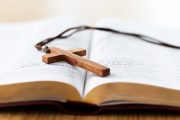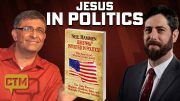Your “rights are suspended” said a church-raiding cop to a Mississippi pastor at a service last week. And it didn’t matter that the people in attendance were listening to the sermon while seated in their cars. Yet while First Amendment exercise is squelched across the country, “liquor stores, marijuana dispensaries, and abortion clinics are deemed ‘essential’ by government bureaucrats during the coronavirus outbreak,” lamented actor Kevin Sorbo recently. Moreover, this reality, he said, speaks volumes about “the morbid condition of America.”
Sorbo, the 61-year-old performer perhaps most famous for playing Hercules in the eponymous 1990s TV series, made his powerful observation in a Thursday tweet (below) which, interestingly, has not received much attention.
In a nation where liquor stores, marijuana dispensaries, and abortion clinics are deemed “essential” by government bureaucrats during the coronavirus outbreak, and church attendance is judged non-essential, we don’t have to study long to diagnose the morbid condition of America
— Kevin Sorbo (@ksorbs) April 9, 2020
Sadly, the actor is not exaggerating. Mississippi, for instance, not only has kept its liquor stores open, but has temporarily amended its rules to allow the establishments to sell alcohol over the phone or online and customers to pick up their orders in the retailers’ parking lots.
(I guess the thinking during this tough time is, as the song says: “I’d rather have a bottle in front of me than have to have a frontal lobotomy.”)
Contrast this with the Greenville, Miss., churchgoers who — while listening to a sermon from their cars in a parking lot last week — were reportedly fined $500 for refusal to cease exercising their First Amendment rights.
Moreover, in one of the two churches targeted, the King James Bible Baptist Church, Pastor James Hamilton was told by one uniformed police officer that his “rights are suspended,” related Kelly Shackelford of the First Liberty Institute, which is representing the church.
Shackelford told Fox News host Tucker Carlson Friday night (video below) that Greenville’s action is “massively unconstitutional” and “targets churches in a way that it targets no other group.”
The church leadership had said that it planned to hold drive-in services Easter Sunday as well, in defiance of Greenville and its mayor, Democrat Errick Simmons — even if it means jail time.
Meanwhile, the other church targeted, Temple Baptist, is suing the city of Greenville for First Amendment violations. It’s being represented by Christian legal group Alliance Defending Freedom.
On a brighter note, Mississippi’s Republican governor, Tate Reeves, just signed an executive order banning prenatal infanticide, aka abortion, for two weeks.
But this is not the case in Virginia, whose official state motto is, ironically, “Sic semper tyrannis” (“Thus always to tyrants”). While a pastor there was just issued a summons for holding a church service for 16 social-distancing people in a building seating 300 — and now faces up to a year in jail, a $2,500 fine, or both — the state has also explicitly protected prenatal infanticide clinics from being locked down.
Then there’s Kentucky. While its Democrat governor, Andy Beshear, has suspended prenatal infanticide, liquor stores remain open. This would be fine, except that Beshear has also “ordered state surveillance of any in-person church services conducted in Kentucky over Easter,” Christians’ highest Holy Day, reports the Federalist. The authorities will record the license plates of cars in church parking lots and then issue 14-day quarantine orders to all who attend.
One could wonder if all these officials would be as heavy-handed if Muslims insisted on attending mosque services. While I’ve not heard of such defiance in the United States, Muslims in many parts of the world have resisted “lockdown” orders, sometimes stating that Allah would protect them or that the Wuhan virus was his wrath against non-Muslims.
In reality, the virus situation has led to much irrational behavior, with our response governed more by sensationalism than science. For example and apropos here, there’s every reason to believe that responsible church attendance (proper spacing) is less risky than going to grocery stores, where there’s constant, random movement.
Then there’s the scientifically- and law-illiterate cop (video below) in Rotherham, England, who told a father he couldn’t play with his kids on his own front lawn.
The officer was wrong and the police department later apologized to the man. But note that Rotherham is the same place where the police ignored Muslim rape gangs — and the torture and abuse of 1,400 native British girls — for 14 years due to political correctness.
As for the aforementioned safety of churches vs. that of grocery stores, the obvious response is that the authorities are trying to limit people’s exposure to pathogens by only allowing patronage of “essential” establishments. Yet what does it say about our age that only businesses tending to our material needs, important though that is, are deemed essential?
Sure, obtaining food is important, but the wise understand that “man does not live on bread alone.” There are Muslims who’ve recently said, in response to lockdown requests overseas, that they cannot stop worshiping God. Now, say what you will about their theology, one thing is for sure: They believe.
If American public officials really believed — that God and His will and grace are real and not just a “perspective,” comforting illusion, or even a crutch — their conception of what’s “essential” might be a tad different.
At best, their attitude reflects the “I’m spiritual but not religious” notion (Satan is spiritual, too, mind you) involving the idea that you can worship God anywhere, so what’s the difference if you go to church?
Of course, while you certainly can worship God anywhere, and should worship Him everywhere, the Christian ideal involves yet more. Jesus said, “For where there are two or three gathered together in my name, there am I in the midst of them.” God means for us to have communion, to come together, as opposed to being so radically individualistic that our social distancing means being miles apart.
At worst, these church-persecuting officials are hostile to faith, something perhaps reflected when New York City’s mayor Bill de Blasio recently threatened to shut down church buildings permanently.
Either way, Sorbo is right in his diagnosis. Why, one Twitter user actually responded to his tweet with, unbelievably, the following:
People who are dependent on alcohol need access. Marijuana is also needed for various medicinal purposes. Churches need to be closed to prevent the spread of illnesses.
— Sam (@atlanticanglers) April 9, 2020
So this person accepts that liquor stores must remain open because some people want an alcohol fix, but can’t imagine why people want to worship the only one who can provide the fix. That says it all.
Photo: Stacey DiFazio/iStock Editorial/Getty Images Plus
Selwyn Duke (@SelwynDuke) has written for The New American for more than a decade. He has also written for The Hill, Observer, The American Conservative, WorldNetDaily, American Thinker, and many other print and online publications. In addition, he has contributed to college textbooks published by Gale-Cengage Learning, has appeared on television, and is a frequent guest on radio.




